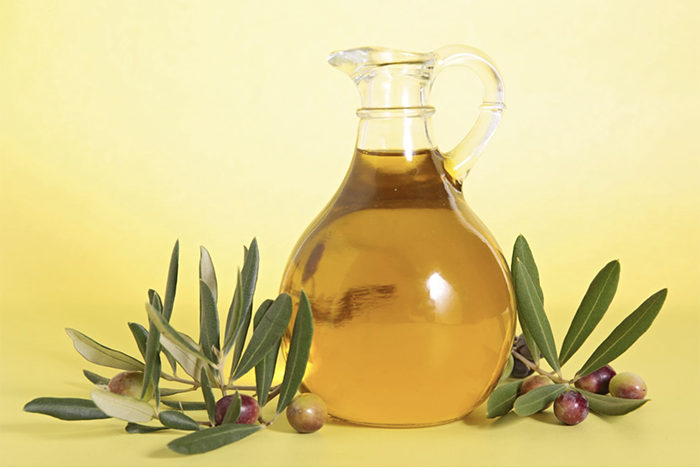| |
Olive oil can prevent fatal heart attacks and strokes
By Stephen Beech via SWNS
January 18, 2022
Clinicians should be counseling patients to replace certain fats, such as margarine and butter, with olive oil to improve their health.

Image: Chatham172/ Shutterstock |
Plenty of olive oil in your diet can prevent a fatal heart attack or stroke, according to a new study.
Researchers found that those who consume more than seven grams - just over a tablespoon - of the oil per day were less likely to die from cardiovascular disease, cancer, dementia or respiratory illnesses.
The long-term study also showed that replacing about 10 grams per day of margarine, butter, mayonnaise and dairy fat with the equivalent amount of olive oil was associated with lower risk of mortality.
Study lead author Dr. Marta Guasch-Ferré, a senior research scientist at Harvard T.H. Chan School of Public Health in the US, said: “Our findings support current dietary recommendations to increase the intake of olive oil and other unsaturated vegetable oils.
“Clinicians should be counseling patients to replace certain fats, such as margarine and butter, with olive oil to improve their health.
"Our study helps make more specific recommendations that will be easier for patients to understand and hopefully implement into their diets.”
Researchers analyzed more than 92,000 men and women free of cardiovascular disease and cancer at the start of the study in 1990.
During 28 years of follow-up, diet was assessed by a questionnaire every four years. The questionnaire asked how often, on average, they consumed specific foods, types of fats and oils, as well as which brand or type of oils they used for cooking and added at the table in the previous year.
Olive oil consumption was calculated from the sum of three items in the questionnaire: olive oil used for salad dressings, olive oil added to food or bread, and olive oil used for baking and frying at home.
One tablespoon was equivalent to 13.5 grams of olive oil. The consumption of other vegetable oils was calculated based on the participants' reported oil brand and type of fat used for cooking at home.
Margarine and butter consumption was based on the reported frequency of stick, tub or soft margarine consumption, and the amount of margarine or butter added from baking and frying at home. Intakes of dairy and other fats and nutrients were also calculated.
The research team found olive oil consumption increased from 1.6 grams/day in 1990 to about four grams/day in 2010, while margarine consumption decreased from about 12 grams/day in 1990 to about four grams/day in 2010. The intake of other fats remained stable.
Olive oil consumption was banded into four categories ranging from never or less than once per month to seven grams (half a teaspoon) or more per day.
Participants with higher olive oil consumption were often more physically active, had Southern European or Mediterranean ancestry, were less likely to smoke and had a greater consumption of fruit and veg compared to those with lower olive oil consumption.
The average consumption of total olive oil in the highest category was about nine grams/day at the start of the study and included five percent of the participants.
When researchers compared those who rarely or never consumed olive oil, those in the highest consumption category had 19 percent lower risk of cardiovascular mortality, 17 percent lower risk of cancer mortality, 29 percent lower risk of neurodegenerative mortality and 18 percent lower risk of respiratory mortality.
The study also found substituting 10 grams/day of other fats - such as margarine, butter, mayonnaise and dairy fat - with olive oil was associated with eight to 34 percent lower risk of total and cause-specific mortality.
They found no significant associations when substituting olive oil for other vegetable oils.
Dr. Guasch-Ferré said: “It’s possible that higher olive oil consumption is a marker of an overall healthier diet and higher socio-economic status.
"However, even after adjusting for these and other social-economic status factors, our results remained largely the same.”
She added. “Our study cohort was predominantly a non-Hispanic white population of health professionals, which should minimize potentially confounding socio-economic factors, but may limit generalisability as this population may be more likely to lead a healthy lifestyle.”
The findings were published in the Journal of the American College of Cardiology. |

